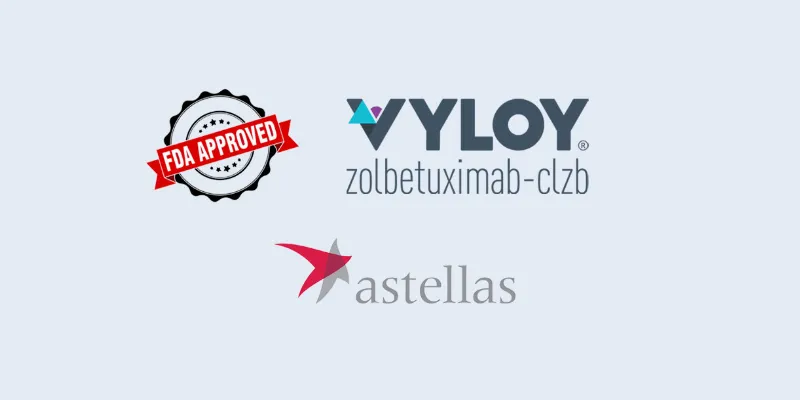FDA Approves VYLOY™ as a New Targeted Therapy for Advanced Gastric and GEJ Cancer

The US FDA has approved zolbetuximab-clzb (VYLOY) as a first-line targeted therapy, in combination with chemotherapy, for the treatment of adults with advanced gastric and GEJ cancer. This marks a significant advancement in the treatment of CLDN18.2-positive tumors, a challenging biomarker in gastric cancer.
Astellas Pharma has announced that the US Food and Drug Administration (FDA) approved VYLOY™ (zolbetuximab-clzb), the first CLDN18.2-targeted therapy for advanced gastric and gastroesophageal junction (GEJ) cancer. In combination with chemotherapy, VYLOY improved progression-free and overall survival in patients with HER2-negative, CLDN18.2-positive tumors.
A New Frontier in Gastric Cancer Treatment
Dr. Samuel Klempner, oncologist and Associate Professor at Harvard Medical School, noted that the approval of VYLOY™ fills an important gap, stating: "While there have been advances in the treatment of gastric and GEJ cancers, patients with CLDN18.2-positive tumors have had few options. This new therapy, based on years of rigorous research, brings hope to those patients and their healthcare teams."
The First CLDN18.2-Targeted Therapy
VYLOY, is the first and only approved therapy targeting the claudin 18.2 (CLDN18.2) protein, a biomarker found in some gastric and GEJ cancers. The FDA’s approval is based on the results of two pivotal Phase 3 clinical trials—SPOTLIGHT and GLOW—both of which demonstrated the therapy’s efficacy in prolonging progression-free survival (PFS) and overall survival (OS) in patients with locally advanced or metastatic disease.
Moitreyee Chatterjee-Kishore, Senior Vice President and Head of Immuno-Oncology Development at Astellas, emphasized the significance of VYLOY's approval. “This achievement is the result of years of dedicated research and development focused on targeting a novel biomarker, and we are grateful to the patients, investigators, and Astellas team members who have made this important advancement for patients a reality.”
The approval of VYLOY™ applies to patients whose tumors are HER2-negative and CLDN18.2-positive, as determined by the FDA-approved VENTANA CLDN18 (43-14A) RxDx Assay. The VENTANA test, developed by Roche Diagnostics, plays a critical role in identifying patients eligible for this treatment, representing a novel step in precision oncology for gastric cancer.
Results from SPOTLIGHT and GLOW Trials
The FDA’s approval is grounded in robust evidence from the SPOTLIGHT and GLOW trials, which enrolled patients with advanced unresectable or metastatic CLDN18.2-positive gastric or GEJ adenocarcinoma. Both trials tested zolbetuximab-clzb in combination with chemotherapy and found significant improvements in survival outcomes compared to chemotherapy alone.
- In the SPOTLIGHT trial, 565 patients received either VYLOY™ with mFOLFOX6 chemotherapy or a placebo with the same chemotherapy. The group treated with VYLOY™ had a median PFS of 10.6 months compared to 8.7 months in the placebo group, and a median OS of 18.2 months versus 15.5 months.
- In the GLOW trial, 507 patients received either VYLOY™ with CAPOX chemotherapy or a placebo with chemotherapy. The VYLOY™ group achieved a median PFS of 8.2 months versus 6.8 months in the placebo group, with a median OS of 14.4 months compared to 12.2 months in the placebo group.
Across both trials, common treatment-emergent adverse events included nausea, vomiting, and decreased appetite, which were consistent with the side effects observed in many cancer therapies.
Approximately 38% of patients with advanced gastric or GEJ cancer have tumors that express the CLDN18.2 biomarker, making them candidates for this targeted therapy. The FDA’s decision follows earlier approvals of VYLOY™ in Japan, the United Kingdom, the European Union, and South Korea, highlighting the global impact of this new therapy.
VYLOY™ has already gained approval in five major markets worldwide, and Astellas Pharma continues to submit applications in other regions, aiming to expand its reach to more patients in need. The drug’s approval has been reflected in Astellas’ financial forecast for the fiscal year ending March 31, 2025, signaling its significant market potential.











Comments
No Comments Yet!